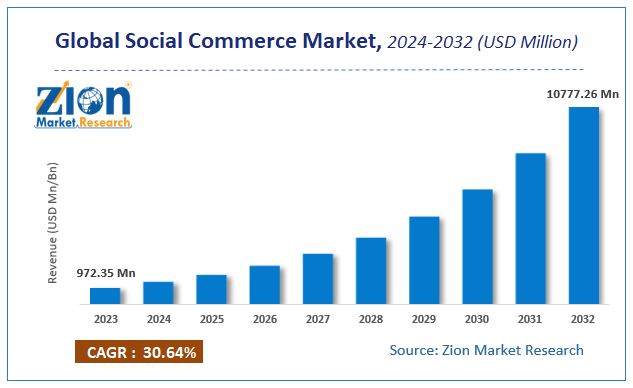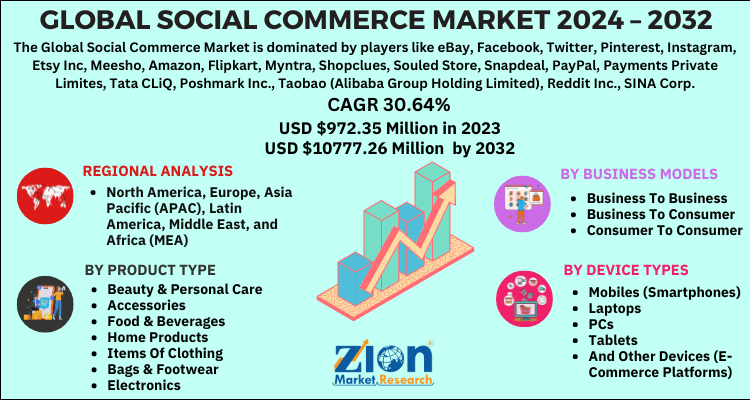Social Commerce Market Size, Share, Growth & Forecast 2032

Social Commerce Market By Business Models ( Business To Business (B2B), Business To Consumer (B2C), and Consumer To Consumer (C2C)), By Device Types ( Mobiles (Smartphones), Laptops, PCs, Tablets, and other devices (E-commerce platforms)), By Product Type ( Beauty & Personal Care, Accessories, Food & Beverages, Health Supplements, Apparel, Home Products, Items Of Clothing, Bags & Footwear, Electronics, and Many Other Products), By Region - Global and Regional Industry Overview, Market Intelligence, Comprehensive Analysis, Historical Data, and Forecasts 2024 - 2032 -
| Market Size in 2023 | Market Forecast in 2032 | CAGR (in %) | Base Year |
|---|---|---|---|
| USD 972.35 Million | USD 10777.26 Million | 30.64% | 2023 |
Description
Social Commerce Market Insights
According to the report published by Zion Market Research, the global Social Commerce Market size was valued at USD 972.35 Million in 2023 and is predicted to reach USD 10777.26 Million by the end of 2032. The market is expected to grow with a CAGR of 30.64% during the forecast period. The report analyzes the global Social Commerce Market's growth drivers, restraints, and impact on demand during the forecast period. It will also help navigate and explore the arising opportunities in the Social Commerce industry.
Global social commerce forms a part of e-commerce. It broadly refers to the buying, selling, and promotion of different commodities and services which are available specifically on social media platforms. The social commerce market comprises local and worldwide marketplaces involving the sale of an array of products to different individual buyers as well as social media followers by small, medium, and large businesses. Several social media platforms such as Facebook, Instagram, Pinterest, and Twitter are generally used on a larger range for social communications.
Global Social Commerce Market: Growth Drivers
Increased usage of smartphones, higher convenience in shopping, and enhanced social media penetration are some of the leading factors that are proving to be beneficial for the growth of the global social commerce market. Enterprises worldwide have been leveraging marketing strategies and tools such as search engine ranking, traffic, consistent audience growth, and authentic engagement to boost their revenue. As the adoption of social media has been spiraling, the utilization of social commerce platforms can deliver commendable results as the era of digitalization ushers in.
The outbreak of the COVID-19 pandemic, along with the imposition of stringent lockdown restrictions across significant regions and major marketplaces including Asia, Europe, and North America of the world, has encouraged global customers to use online channels to shop to adhere to social distancing norms. This has been powering the growth of the global social commerce market.
The increased inclination toward convenience, coupled with the changing lifestyle of people, has been generating greater demand, particularly across emerging economies. The rapid increase in the use of social media marketing tactics and advertising strategies is anticipated to be one of the major growth drivers of the social commerce marketplaces through the forecast timeline.
Global Social Commerce Market: Segmentation
The global social commerce market can be categorized by business models, device types, end-users, product types, and region. According to end-user, the market is segregated into two significant segments, individual users and commercial users.
On the basis of the business models, the market is bifurcated into three essential combinations including business-to-business (B2B), business-to-consumer (B2C), and consumer-to-consumer (C2C).
Based on the breakup by the device types, the global social commerce market is segmented into mobiles (smartphones), laptops, PCs, tablets, and other such devices which help access e-commerce platforms. The smartphone segment is highly likely to emerge as the frontrunner through 2026, driven by the availability of enhanced features, a high number of market participants in the arena, and the latest advancements in technologies including 5G & artificial intelligence (AI).
On the basis of product type, the global social commerce market is segregated into different products such as beauty & personal care, accessories, food & beverages, health supplements, apparel, home products, items of clothing, bags & footwear, electronics, and many other products. Food & beverages, being essentials, are expected to command a considerable portion of the market share, although beauty & personal care products are also exhibiting a high growth rate.
Social Commerce Market: Report Scope
Social Commerce Market: Report Scope
| Report Attributes | Report Details |
|---|---|
| Report Name | Social Commerce Market |
| Market Size in 2023 | USD 972.35 Million |
| Market Forecast in 2032 | USD 10777.26 Million |
| Growth Rate | CAGR of 30.64% |
| Number of Pages | 191 |
| Key Companies Covered | eBay, Facebook, Twitter, Pinterest, Instagram, Etsy Inc, Meesho, Amazon, Flipkart, Myntra, Shopclues, Souled Store, Snapdeal, PayPal, Payments Private Limites, Tata CLiQ, Poshmark Inc., Taobao (Alibaba Group Holding Limited), Reddit Inc., SINA Corp., and Verizon Communications Inc |
| Segments Covered | By Business Models, By Device Types, By Product Types and By Region |
| Regions Covered | North America, Europe, Asia Pacific (APAC), Latin America, Middle East, and Africa (MEA) |
| Base Year | 2023 |
| Historical Year | 2018 to 2022 |
| Forecast Year | 2024 - 2032 |
| Customization Scope | Avail customized purchase options to meet your exact research needs. Request For Customization |
Global Social Commerce Market: Regional Analysis
North America might emerge as the leading revenue contributor in the overall global social commerce market, due to the increasing adoption of cutting-edge technologies, higher adoption of smartphones, tablets, & laptops by the country, and the presence of numerous enterprises in the region. The U.S. and Canada are likely to emerge as the leading segments in the North American industry, thanks to the growing popularity of Facebook, Instagram, Twitter, and YouTube. The sky-rocketing demand for hand-made products including handmade paintings, miniatures, jewelry, and other art is pushing the use of social commerce platforms.
Asia Pacific is projected to develop into a swiftly growing market through the upcoming years, adding considerably to the overall global social commerce market share by 2026. India, China, Japan, Indonesia, Malaysia, Australia, and Singapore are anticipated to witness a substantial uptick in demand for social commerce solutions in order to cater to the needs of customers, who are leniently spending on luxury products such as high-end perfumes, leather bags & accessories, and branded clothing.
Global Social Commerce Market: Competitive Players
The competitive landscape of the global social commerce market is considered with the profiles of the key players prevailing in the markets. The vital key players of the markets are:
- eBay
- Etsy Inc
- Meesho
- Amazon
- Flipkart
- Myntra
- Shopclues
- Souled Store
- Snapdeal
- PayPal
- Payments Private Limites
- Tata CLiQ
- Poshmark Inc.
- Taobao (Alibaba Group Holding Limited)
- Reddit Inc.
- SINA Corp.
- Verizon Communications Inc.
The global social commerce market is segmented as follows:
By Business Models
- Business To Business (B2B)
- Business To Consumer (B2C)
- Consumer To Consumer (C2C)
By Device Types
- Mobiles (Smartphones)
- Laptops
- PCs
- Tablets
- and other devices (E-commerce platforms)
By Product Type
- Beauty & Personal Care
- Accessories
- Food & Beverages
- Health Supplements
- Apparel
- Home Products
- Items Of Clothing
- Bags & Footwear
- Electronics
- and Many Other Products
Global Social Commerce Market: Regional Segment Analysis
- North America
- The U.S.
- Canada
- Europe
- France
- The UK
- Spain
- Germany
- Italy
- Rest of Europe
- Asia Pacific
- China
- Japan
- India
- South Korea
- Southeast Asia
- Rest of Asia Pacific
- Latin America
- Brazil
- Mexico
- Rest of Latin America
- Middle East & Africa
- GCC
- South Africa
- Rest of Middle East & Africa
What Reports Provide
- Full in-depth analysis of the parent market
- Important changes in market dynamics
- Segmentation details of the market
- Former, ongoing, and projected market analysis in terms of volume and value
- Assessment of niche industry developments
- Market share analysis
- Key strategies of major players
- Emerging segments and regional markets
- Testimonials to companies in order to fortify their foothold in the market.
Table Of Content
FrequentlyAsked Questions
Increased inclination toward the convenience, coupled with the changing lifestyle of people, has been generating greater demand particularly across the emerging economies. The rapid increase in the use of social media marketing tactics and advertising strategies is anticipated to be one of the major growth drivers of the social commerce marketplaces through the forecast timeline.
Asia Pacific is projected to develop into a swiftly growing market through the upcoming years, adding considerably to the overall global social commerce market share by 2026. India, China, Japan, Indonesia, Malaysia, Australia, and Singapore are anticipated to witness a substantial uptick in demand for social commerce solutions in order to cater to the needs of customers, who are leniently spending on luxury products such as high-end perfumes, leather bags and accessories, and branded clothing.
The competitive landscape of the global social commerce market is considered with the profiles of the key players prevailing in the markets. The vital key players of the markets are eBay, Facebook, Twitter, Pinterest, Instagram, Etsy Inc, Meesho, Amazon, Flipkart, Myntra, Shopclues, Souled Store, Snapdeal, PayPal, Payments Private Limites, Tata CLiQ, Poshmark Inc., Taobao (Alibaba Group Holding Limited), Reddit Inc., SINA Corp., and Verizon Communications Inc.
Social commerce is the innovative integration of e-commerce and social media, where online shopping experiences are seamlessly incorporated into social media platforms. Social media marketing is a powerful strategy that leverages popular platforms like Facebook, Instagram, and Pinterest to connect businesses with their target audience. By utilising these channels, companies can effectively promote and sell their products or services directly to consumers, resulting in increased brand awareness and revenue. Social commerce is a cutting-edge approach that leverages various features such as shoppable posts, live streaming, influencer marketing, and user-generated content to enable seamless transactions and create an immersive shopping experience within the social media ecosystem. Leveraging the potential of social media and user involvement, this strategy aims to boost revenue and cultivate meaningful customer engagement.
HappyClients
Zion Market Research
Tel: +1 (302) 444-0166
USA/Canada Toll Free No.+1 (855) 465-4651
3rd Floor,
Mrunal Paradise, Opp Maharaja Hotel,
Pimple Gurav, Pune 411061,
Maharashtra, India
Phone No +91 7768 006 007, +91 7768 006 008
US OFFICE NO +1 (302) 444-0166
US/CAN TOLL FREE +1 (855) 465-4651
Email: sales@zionmarketresearch.com
We have secured system to process your transaction.
Our support available to help you 24 hours a day, five days a week.
Monday - Friday: 9AM - 6PM
Saturday - Sunday: Closed







